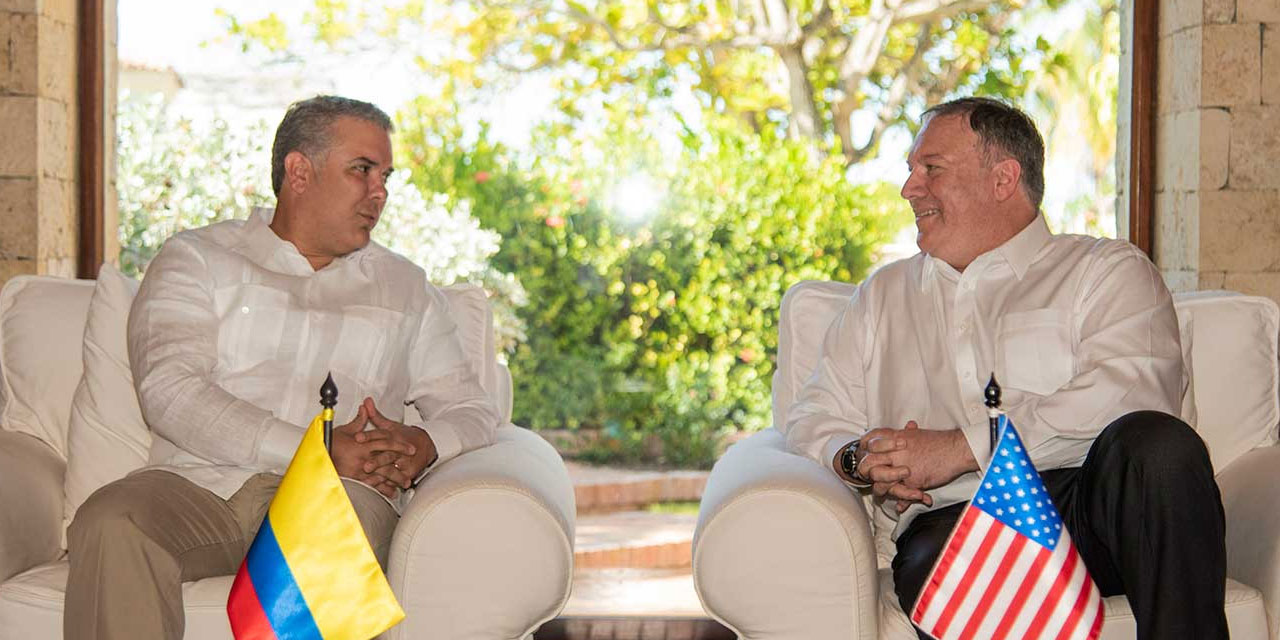United States Secretary of State Mike Pompeo reiterated his country’s long-standing priorities in Colombia after a meeting with President Ivan Duque on Wednesday.
The brief press conference that followed Pompeo’s meeting with Duque and other government representatives was hardly substantial and introduced no subjects that weren’t on the bilateral agenda when former Presidents Barack Obama and Juan Manuel Santos were still in office.
Peace
Pompeo reiterated Washington DC’s expressed support for Colombia’s ongoing peace process that began in late 2016 after a deal between far-left rebel group FARC, the Santos administration and victims.
US President Donald Trump withdrew his country’s special envoy to this process after taking office in 2017, leaving the process mainly in the hands of the United Nations and the European Union.
Despite Trump’s attempts to slash financial support for Colombia, US Congress allocated $391 million in aid to Colombia last year that maintained Obama’s “Peace Colombia” initiative.
US will again give $391M in aid to Colombia, despite Trump effort at cuts
A request to extradite the FARC’s former ideologue “Jesus Santrich” on an unsubstantiated DEA claim that the former rebel leader tried to export 10 tons of cocaine plunged the peace process in crisis in April last year.
US Secretary of State Mike Pompeo
Duque fiercely opposed the peace process ahead of his election in June last year, and has reluctantly been implementing the process under pressure from Congress, the country’s high courts and the international community.
Colombia’s president thanked Trump and US Vice-President Mike Pence for strengthening “not just our idea of building peace with lawfulness, justice, with the rule of law, with order, but also to allow ourselves to build peace based on that lawfulness with entrepreneurship.”
Drugs
The peace process included an element to curb drug trafficking, one of the primary fuels of violence in the South American country and a top priority for the US, the world’s largest consumption market for cocaine.
Washington DC has been forced to adapt its traditionally repressive strategy to curb cocaine production to the strategy supported by the UN and the EU that seeks to curb the production of cocaine through economic development and the voluntary substitution of coca, the base ingredient for cocaine, with legal crops.
Pompeo reiterated his government’s support for a strategy agreed with Duque’s predecessor that seeks to reduce the cultivation of coca, which reached record levels in 2017, with 50% by 2023.
This new strategy includes the voluntary substitution of coca and the strengthening of the rule of law in rural areas that were abandoned by the state and controlled by guerrillas for decades.
Additionally, Pompeo vowed to continue efforts to reduce the demand for cocaine in the US.
US Secretary of State Mike Pompeo
US shifting away from hardline stance on Colombia drug trafficking
Trade
Pompeo praised the “excellent economic partnership” and a 2012 free trade agreement between the two countries that turned Colombia’s trade surplus into a deficit and caused a crisis in the South American country’s agricultural sector.
Despite Colombian farmers’ 2013 revolt and claims that the imports of subsidized and genetically modified agricultural products from the US contributed to the boom in coca cultivation, Pompeo reiterated his government’s interest to further eliminate trade barriers.
US Secretary of State Mike Pompeo
Colombia’s trade balance with US (millions of dollars)
Pompeo continued to push against Colombia’s resistance to deregulate pharmaceutical imports. Colombia’s former Health Minister, Alejandro Gaviria, consistently resisted this, claiming such an agreement would make life-saving medicine in the South American country affordable for the poor.
Duque appeared to have ended this resistance.
US Secretary of State Mike Pompeo
Colombian President Ivan Duque
Experts defend Colombia in battle with Novartis over cheaper cancer drug
Venezuela
Last but not least, Pompeo and Duque both continued their opposition to the authoritarian government in Venezuela while supporting the far-right government in Brazil.
Pompeo refused to respond to reporters’ questions about the possibility of a military intervention in Venezuela, whose leftist government has plunged the country in crisis.
Duque, however, said in his speech that he would be willing to “do whatever is necessary and deploy every single effort possible to re-establish democracy and constitutional order in Venezuela.”
The economical and political crisis in Venezuela spurred the migration of more than a million Venezuelans, aggravating the situation of Colombia’s 7.5 million internally displaced victims of the country’s armed conflict.


